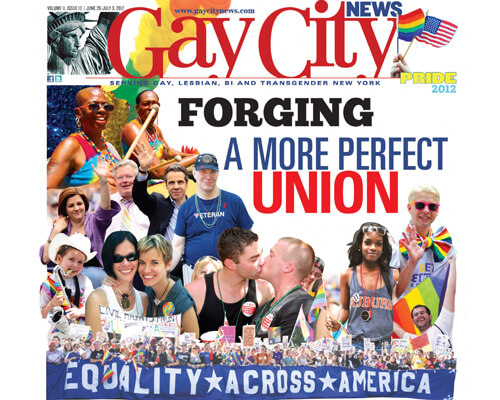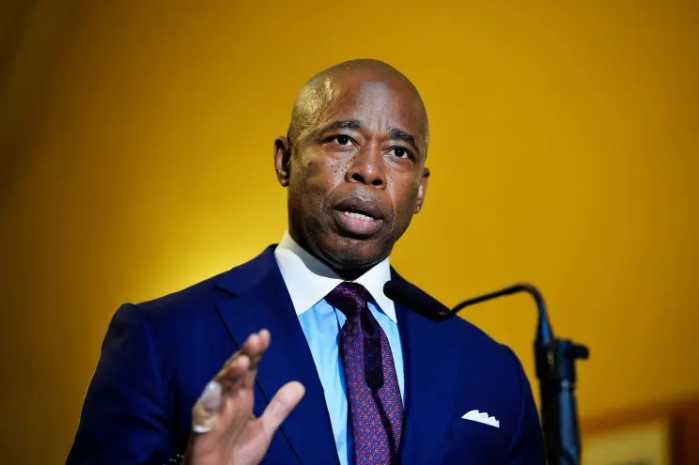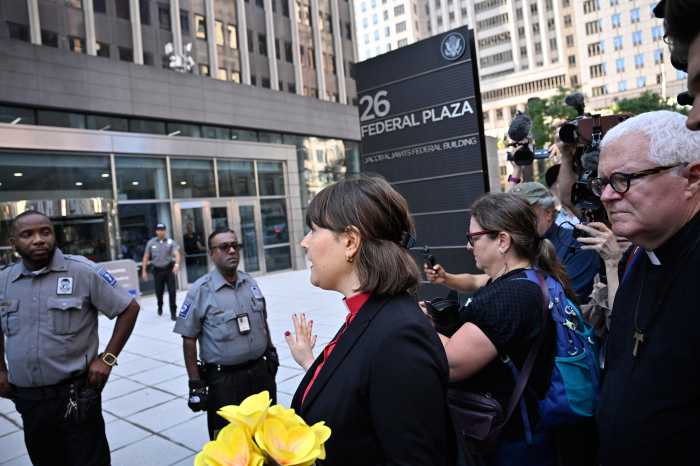When Gay City News published its first LGBT Pride issue 10 years ago this week, our cover photo was of Karen and Marcye Nicholson-McFadden, who were one of seven plaintiff couples in Lambda Legal’s lawsuit for marriage rights in New Jersey.
At that time, no state afforded lesbian and gay couples marriage equality. The victory in Massachusetts was almost a year and a half away — and New York’s, nine years. The sitting president in 2002 was hatching a strategy for reelection two years down the road that had as its cornerstone a cynical ploy to pull out conservative evangelical voters in swing states with a host of ballot measures banning same-sex marriage.
New York State didn’t have a gay rights law then. Nor did it offer public school students who were lesbian, gay, transgender, or questioning safeguards against bullying and harassment. Protections for the state’s LGBT citizens — outside of localities, such as New York City — consisted of a hate crimes law and survivor benefits for those who lost a same-sex partner in the 9/11 attack.
At the federal level, there were still no constitutional protections for those arrested on sodomy charges. The Matthew Shepard and James Byrd, Jr., Hate Crimes Prevention Act would not be enacted for another seven years. Openly gay and lesbian service members were being rooted out of the military. Entry into the US was denied to anyone who acknowledged being HIV-positive.
Every one of those things has changed — except that advocates in New Jersey, where the state’s high court ruled in 2006 that same-sex couples are entitled to at least civil union rights, are still battling for full marriage equality, most recently in the face of a veto by Republican Governor Chris Christie.
And, in noting the phenomenal progress here in New York, it must be acknowledged that we have still not done right by the transgender community, which remains outside the purview of civil rights protections that gays and lesbians won in December 2002.
America’s LGBT community finds itself at a critical crossroads during Pride Month 2012. The next six months could prove a make or break period that we may well look back on as pivotal long into the future.
The most pressing challenge, of course, comes in the November election. Making certain that President Barack Obama is given another four years in the White House is indispensible if we are to hope for further progress at the federal level. Like many progressive constituencies, many LGBT voters have often voiced frustration at the pace of change under the president’s stewardship.
Whatever disagreements we may have or issues on which we demand action, however, there is no disputing the historic advances our community has made under this president. To cite only the most significant — gay men and lesbians can now serve openly in the military; visitors living with HIV can now gain entry into the US; LGBT Americans are now assured of access to their partners in hospitals; federal hate crimes law now protects gay, lesbian, bisexual, and transgender victims; our country is now affirmatively leading on gay rights globally; the Justice Department no longer defends the odious 1996 Defense of Marriage Act (DOMA); and the most powerful leader in the world has endorsed our right to marry.
Mitt Romney, at his very best, would throw us into a crater of benign neglect — and it could well be far worse. He supports DOMA. While he has made no noise about reinstating Don’t Ask, Don’t Tell, he showed no support for its repeal, either. Given that he displayed no spine in defending his short-lived national security spokesman, Richard Grenell, who is gay, from vicious right-wing attacks, there is no reason to believe he would stand up to radical House Republicans who would deny the Pentagon adequate funding to ensure that gay and lesbian integration into the military proceeds smoothly.
Though Romney has made bland pronouncements about being opposed to discrimination, it is unclear if he would advocate for — or even support — the federal Employment Non-Discrimination Act (ENDA).
The most damning indictment of the Republican presidential nominee, however, is that he really stands for nothing other than Mitt Romney’s advancement. The stark contrast between his posture on gay rights today and his rhetoric during his unsuccessful challenge to Senator Ted Kennedy in 1994, his demagoguery in response to the Massachusetts high court’s marriage equality ruling in 2003, and his outright fabrications on how that decision supposedly led the Catholic Church to abandon its adoption services all speak to a fundamental lack of character, on which no community, least of all ours, can bank.
The issue of ENDA raises a second critical challenge facing us this year — returning the Democrats to control of the US House. Speaker John Boehner has made it abundantly clear he has no intention of entertaining our community’s goals. In fact, his one initiative on LGBT issues since assuming the speakership has been to step into the breach left by the Justice Department to battle on behalf of DOMA in the courts. Democrats must gain at least 25 House seats and also fight hard to keep their majority in the Senate.
Election Day drama will not be confined to the presidential, Senate, and House contests. In four states, our right to marry is at stake. In Maryland and Washington State, voters must decide whether to retain marriage equality laws approved earlier this year by their Legislature and governor. In Maine, gay advocates are going back to the ballot to reverse a 2009 voter initiative that overturned the marriage equality law enacted earlier that year. And in Minnesota, despite the pro-marriage equality posture of Democratic Governor Mark Dayton, the LGBT community must fend off a right-wing effort to write discrimination into that state’s constitution.
We hear a lot these days about the growing support for equal marriage rights among Americans. But we can’t forget that we have lost nearly three-dozen similar referendums around the country. These contests are crucial.
This year, however, may be best remembered for the gay marriage question finally reaching the Supreme Court. A Boston federal appeals court’s recent ruling striking down DOMA makes high court review in the term beginning this October a likelihood. The decision by a different appellate circuit in San Francisco invalidating California’s Proposition 8 means that issue could also make its way onto the Supreme Court docket this fall. Ready or not, our time in front of the conservative Roberts court may be at hand.
This Pride, we’re all reminded of the blessings of living in interesting times. We all have a role to play, and should we neglect to do so, we really can’t blame others if we don’t get what we want.
Happy Pride.

































